Once again, StateWays has recognized innovation in the control states with our third-annual Best Practices Awards. This year’s winners include agencies leading the way in retailing, warehouse automation, consumer education, industry outreach and more.
All beverage alcohol control jurisdictions throughout North America are eligible to enter the awards. The winners will be recognized during the NABCA Administrators Conference in Grand Rapids, Michigan in October.
Don’t see your name on the list? Entries for the 2018 Best Practices Awards will open next spring.
Congratulations to the Winners! Keep an eye out for additional articles posted to our site in the coming weeks for a look at how these other category winners excelled.
OVERALL WINNER
New Hampshire Liquor Commission
BEST CONSUMER EDUCATION PROGRAM
Virginia Department of Alcoholic Beverage Control
BEST RETAIL INNOVATION
Pennsylvania Liquor Control Board
BEST TRADE OR LICENSEE EDUCATION PROGRAM
Iowa Alcoholic Beverages Division
BEST WAREHOUSE INNOVATION
Oregon Liquor Control Commission
BEST TECHNOLOGY INNOVATION
Idaho State Liquor Division
BEST LEGISLATIVE OUTREACH PROGRAM
Montgomery County Department of Liquor Control
BEST CONSUMER TASTING PROGRAM
Windom Municipal Liquor Store
Granite State Greatness: The New Hampshire Liquor Commission Excels Across the Board
A past winner in 2015 for Best Technology Innovation and 2016 for Best Warehouse Innovation, the New Hampshire Liquor Commission is this year’s Overall Winner for the Control State Best Practices Awards.
The NHLC’s net revenue last year was $156 million, with 100% of proceeds going to the general fund, helping to continue the state’s tradition of having no sales or income tax. The state set an all-time sales record in fiscal year 2016 with $678 million in gross sales, a 5.5% increase over the previous year.
The NHLC acts as the sole distributor of wine and spirits in the state, and operates 79 Liquor & Wine Outlets. In addition, there are three agency stores in the state and more than 1,400 off-premise licensees that sell wine (mostly grocery stores).
The agency is being recognized for its work improving warehouse operations, renovating retail stores, implementing technological innovations, educating consumers and partnering with licensees.
Warehouse Upgrades
The NHLC partners with DHL on its warehouse, which features streamlined processing, sophisticated IT, instant auditing and tracking, electronic billing and an intuitive design. Over the past year, the two organizations have implemented a series of initiatives to streamline the customer ordering process and add weekend delivery service to high-volume stores. The warehouse has also seen upgrades to enhance route tracking, which is aimed at maximizing revenue, increasing efficiency and improving customer service.
“In the last six years we’ve increased our retail square footage by over 40%, and every time we’ve opened or relocated a store we’ve reviewed our business practices to see what we can do better because there’s always room for improvement,” says Deputy Commissioner Michael Milligan. “The innovations DHL have brought us are priceless. They’ve looked at every one of our stores to see how they can be more efficient, including routing traffic and delivery times. That may not sound significant, but we’ve been able to cut our labor costs by $7 million thanks to efficient ordering and deliveries.”
The warehouse also recently added a will-call area for licensees to pick up orders themselves. The state has nearly 5,000 licensees, ranging from big box retailers to small single-store owners.
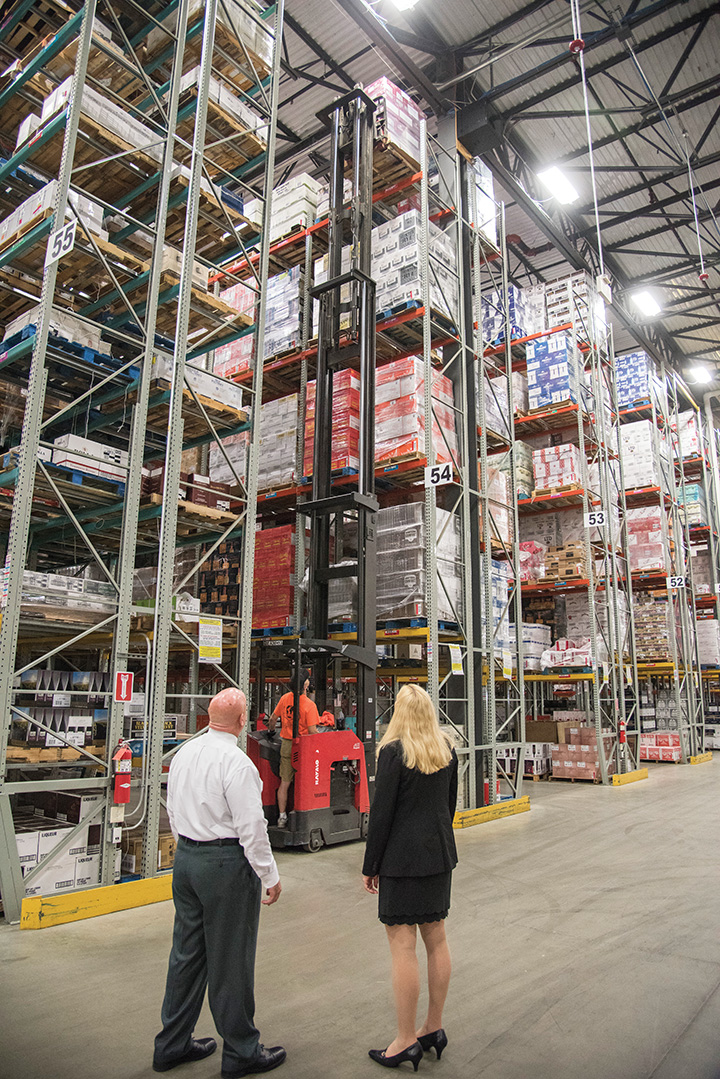 “It’s been very successful,” says Chairman Joseph Mollica. “They’re averaging 7,500 cases per month and more than 400 customers are using the will-call option. They can go online and place an order or call it in, and pick it up for free. That’s great for local businesses.”
“It’s been very successful,” says Chairman Joseph Mollica. “They’re averaging 7,500 cases per month and more than 400 customers are using the will-call option. They can go online and place an order or call it in, and pick it up for free. That’s great for local businesses.”
As the agency continues its aggressive store renovation and relocation process, DHL has greatly aided in improving the stocking process.
“We’re able to put together orders based on the shelving layout in the store,” says director of sales, marketing, merchandising and warehousing Nicole Brassard-Jordan. “It’s many tractor trailers going in to stock the store and set up displays, so we may have 30 people unloading the trucks and stocking the store.”
In prior years, shipments would arrive with palettes destined throughout the store and onsite workers would be tracking down codes and matching them to diagrams. Now, an entire wall or aisle arrives in a single shipment.
“It doesn’t get any easier than opening the back of a truck and having everything laid out based on a shelf set,” Mollica says.
Innovative Technology
Over the past four years, the NHLC has undergone a strategic campaign to renovate and relocate its 79 stores, creating the need for upgraded information technology capabilities. As a result, the agency collaborated closely with the NH Department of Information Technology (DOIT) to enhance its technology and improve productivity as it opened a record six new stores in the summer of 2016.
“We have a 30-year-old back-end system, and our DOIT partners who work in this building have long had to mitigate risk for us,” Brassard-Jordan says. “There are risks from servers being here, from not having the proper pipeline for data transfer, etc… In years past, we would open a new store and the registers wouldn’t be ready, but that’s not the case anymore – everything is up and running the morning we do a soft opening. I’ve dealt with registers going down and the impact it has on customers. We don’t want that, and they’ve done an outstanding job of mitigating those risks for us.”
The agency’s work with DOIT has also reduced store outages due to network errors by 89 percent, created backup data communications at high-volume retail locations and deployed upgraded voice communication systems. And there’s more to come.
“The biggest technology changes we’ll take advantage of haven’t happened yet,” Mollica says. “Our next generation system is a $30 million back- and front-of-the-house system we’re adding to our stores. Before we started implementing it, we couldn’t accept chip cards, offer certain discounts or institute a loyalty program. There was also no tie-in electronically between the stores and our advertising, but our new system will be able to do all that.”
The upgrades will also help the enforcement arm of the agency, which is already seeing improvement thanks to the use of tablets in the field.
“Technology is the backbone of a lot of things the enforcement, licensing and education departments are doing,” Milligan says. “The geography and demographics of New Hampshire are difficult, with our 1.3 million people very spread out. When someone applies for a license and we do an inspection, we’ll soon be able to manage that effort in the field in real-time rather than having to check in with headquarters or file a physical report first. The last thing a business owner applying for a license wants to hear is that there will be a delay. So we’ll be better serving our customers, and we’ll be saving a lot of time and money too.”
Eye-Catching Displays
In March of 2015, the NHLC opened two 20,000-square-foot Liquor & Wine Outlets anchoring welcome centers along Interstate 93 in Hooksett. The welcome centers are a private-public partnership designed to boost the economy and tourism. In each of the two stores, the agency created an advertising pilot program that utilizes a large wall near the checkout, which accommodates ads as large as 10×40 feet.
The locations handle more than 1 million customer transactions per year, making them an ideal place to provide broker and supplier partners with opportunities to promote products.
“It’s an expensive way to advertise, but they get a lot of bang for the buck,” Mollica says. “Suppliers that have taken part have seen great lift in their sales. The ads really jump off the wall because they’re not just flat, there’s room for three dimensions. They make customers want to look for the product.”
More than a dozen brands have participated in the program so far, ranging from product promotions to charitable messaging to responsible consumption ads.
“It really enhances the customer shopping experience,” Brassard-Jordan says. “These are dynamic ads and I can’t think of a better use for that space. We’re currently expanding our offerings to tie the display ads with print advertising in our Celebrate NH magazine.”
Partnering with Licensees
When two major supermarket chains closed in New Hampshire, the NHLC decided to expand its popular “Price Buster” program at Liquor & Wine Outlets to its licensee partners. The new Off-Premise Price Buster program helps retailers, including grocery stores and wine shops, feature select wines at promotional prices. All deals are non-competing with promotions at state stores, giving licensees an exclusive deal and advantage for that time period.
“The bottom line is, they’re our customers,” Brassard-Jordan says. “As a wholesaler, they’re very important to us. We’re always looking for ways to make their listings better, and every month we place an ad in the grocer’s association publication to promote the wines discounted that month. Those items are really important to them, and we’re glad to give them an advantage on pricing.”
In terms of volume, 75% of spirit and wine sales come from Liquor & Wine Outlet locations, while 15% come from off-premise licensees and 10% come from on-premise locations. The NHLC is doing whatever it can to help its partners, rather than increase its own share of the market.
“Governor Sununu’s mantra is customer service, and we’re continually reaching out to customers and helping them,” Mollica says. “We want to make them happy and able to sell the products that will create profit and serve their customers. The most important thing to us is that we’re in the people business.”
In 2016, off-premise licensees saved $2.9 million thanks to the Price Buster program, and in a partial year of 2017 they’d already saved $3.2 million.
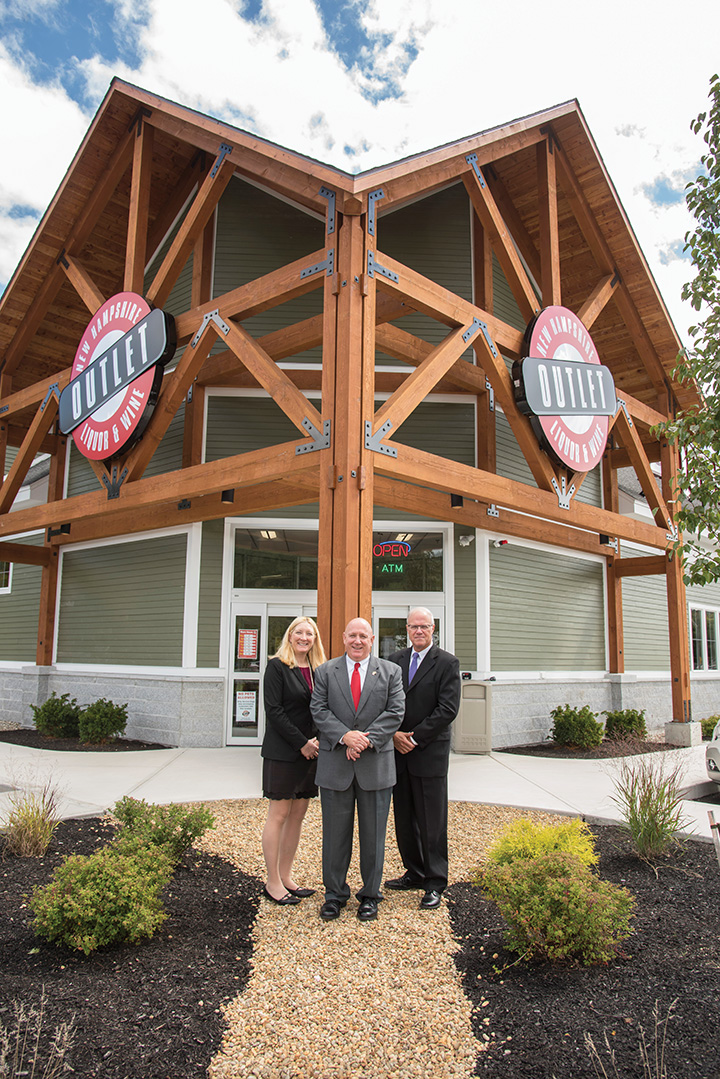 Unique Retail Offerings
Unique Retail Offerings
The NHLC has greatly expanded its barrel buying program since it purchased its first Bourbon barrel in 2001. This year, the agency made its first visit to Mexico to buy barrels of tequila – it ended up tasting 30 tequilas over three days from Patron, Herradura and Casa Noble, purchasing nine barrels for the state’s stores.
In order to give customers a deeper understanding of these exclusive spirits, each store featured detailed tasting notes to accompany the bottles on display. All employees were also trained on each tequila so they could pass along their knowledge and direct customers based on taste preferences. The agency also hosted brand ambassadors from all three suppliers to lead educational seminars, selling out each event.
“It’s unreal how responsive customers are to the barrel program,” Mollica says. “It’s grown year after year, from one barrel to hundreds of barrels in 2017. Customers can’t get enough because it’s unique and millennials love one-off products. If you’d told me five years ago we would go to Kentucky and Tennessee and buy sixty barrels at a time, I’d have said you were out of your mind – but I’m happy to be wrong in this case.”
A tasting in Nashua for 40 people resulted in seven cases sold, with products averaging $50 per bottle. And a recent Jack Daniel’s event centered around a 17-barrel purchase sold out as well, selling so much product that bottles needed to be brought in from around the state to fulfill the orders.
“It’s a great way for consumers to buy something completely unique,” Mollica says.” And where else can you meet a master distiller that close to home? Consumers love that, and we get excited about it too.”
Meet the InvestiGATOR
Each year during Alcohol Awareness Month in April, the NHLC enforcement and licensing division hosts a statewide poster contest designed to empower students. This year the agency received nearly 400 submissions from 11 schools around the state. The winning schools received a visit from the InvestiGATOR, an alligator dressed like a detective who serves as a mascot for the department.
“It’s a way to appeal to kids and we’ve tried to make it as ubiquitous a program as we can, so when folks see the mascot they think of responsible consumption,” Milligan says. “In 2016 the InvestiGATOR had 120,000 impressions at Fisher Cats (minor league baseball) and Monarch (minor league hockey) games. It’s significant, because you’re reaching a lot of kids from diverse communities that way.”
At the end of the day, the agency is owned by the citizens of New Hampshire, and running it is a responsibility Chairman Mollica takes seriously.
“Growing up in the restaurant business, I know how important our role is,” he says. “We want to take care of our customers because they’re our family. We want them to get home safely, and that’s always in the back of my mind in the way we run this agency. We make sure our stores are run responsibly, and the enforcement division is doing what it needs to do. We’re in the good-time business, but we want them to have a good time safely and responsibly. We take it seriously, and we’re proud that the NHLC is noted throughout the control states as a responsible partner.”
Jeremy Nedelka is editor of StateWays. Reach him at JNedelka@epgmediallc.com

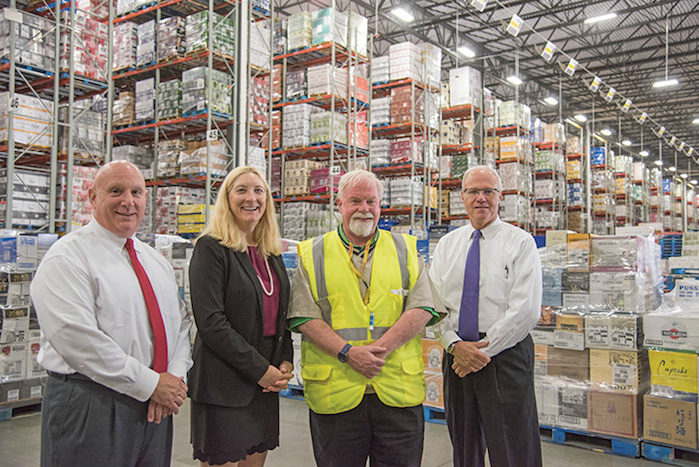
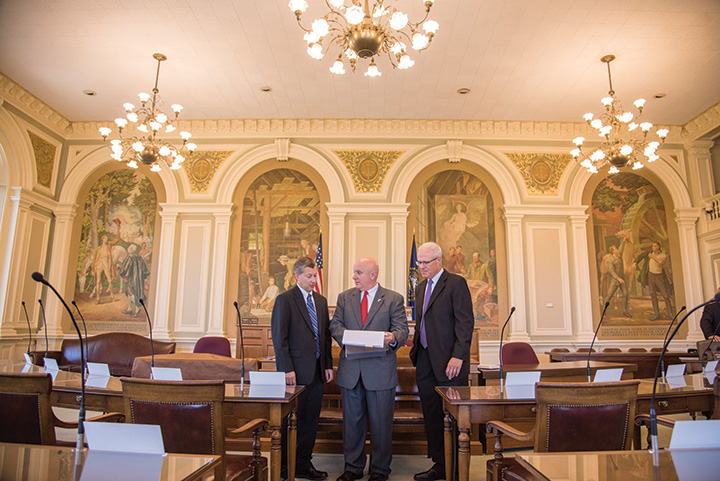
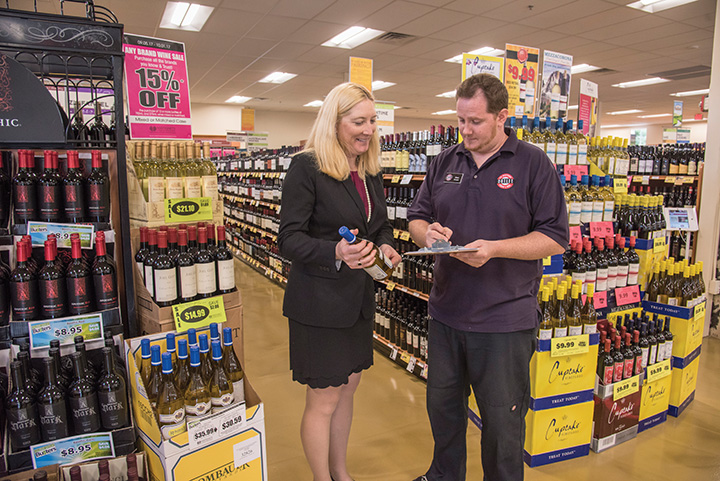











[…] to Find Rare Spirits” by Serious Eats. In 2017, StateWays Magazine honored NHLC for its “Granite State Greatness,” naming New Hampshire the nation’s top control state. NHLC was also featured in Forbes, one of the […]
[…] to Find Rare Spirits” by Serious Eats. In 2017, StateWays Magazine honored NHLC for its “Granite State Greatness,” naming New Hampshire the nation’s top control state. NHLC was also featured in Forbes, one of the […]